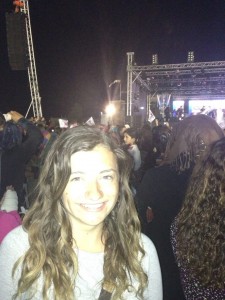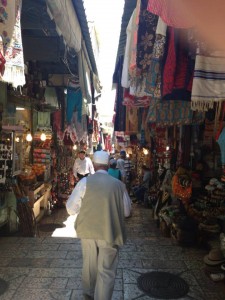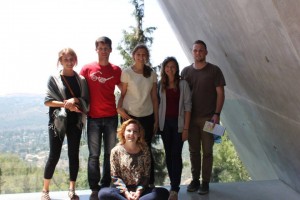My name is Caroline Tooker, I’m a Sophomore at Loyola majoring in International Business with a minor in Arabic Language and Culture. This summer, I spent two months in the West Bank. I hadn’t really planned out my trip and only knew I was going ten days before I got on the plane, so I had no idea what to expect. I had never really studied Palestine, and honestly was very ignorant of the political problems. When I arrived, I came through the Ben Gurion airport and everything was in three languages: Hebrew, English, Arabic. As soon as we entered the West Bank, there was no Hebrew to be seen. Most people in Bethlehem spoke English very well, along with Spanish and Russian due to the large amount of religious tourists. My host mother was deaf however, and never learned another language than Arabic so it was much easier to practice with her.
Almost everyone I met throughout the West Bank was friendly and kind; strangers welcomed me into their homes, shopkeepers let me practice basic Arabic, and every time I got horribly lost walking some helped me, once giving me a ride all the way across town, or twenty minutes away.
Though most people could speak English fluently, every time I tried to speak in Arabic, people were very encouraging, correcting mistakes and overly enthusiastic every time I got something right. I found the colloquial to be much easier to understand than modern standard, but since I was only there for a short time I only learned the basic fundamental phrases.
Despite the extremely tense political problems and my native countries involvement, no was ever rude or cold towards me. The longer I stayed and the more I learned, I became increasingly amazed by everyone I met and their genuine willingness to help me understand not only Arabic but the history and the culture. No one gets excited in the United States if you can speak English, it is expected. In the West Bank, people would be thrilled I was even attempting to speak Arabic. When I would get a taxi to go home, the driver would strike up a conversation and if I said the directions in Arabic, would immediately become friendlier. Several times people told me their family’s story, where they were originally from in a mix of Arabic and English, once even a man drove my friend and I twenty minutes out of the way to show us important places to him, and refused to let us pay him for the ride.
The library I worked in for a month was run by two women who helped me improve my writing and colloquial diction. They were very open and honest about the difficulties of living there as a working mother, and some of the different aspects of their lives I would never understand if I hadn’t travelled all the way to Bethlehem. Living far away from home was hard, especially since the culture was so different. But it was one of the best experiences I have ever had, and made me even more excited to really learn Arabic and about the cultures that speak it.



